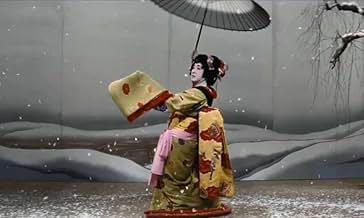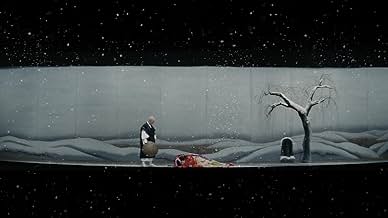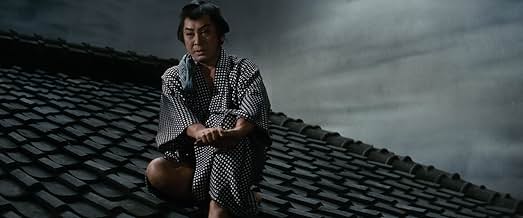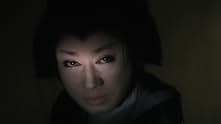Yukinojo, un actor de kabuki, busca venganza destruyendo a los 3 hombres que causaron la muerte de sus padres. También participan la hija de uno de los objetivos de Yukinojo, 2 maestros ladr... Leer todoYukinojo, un actor de kabuki, busca venganza destruyendo a los 3 hombres que causaron la muerte de sus padres. También participan la hija de uno de los objetivos de Yukinojo, 2 maestros ladrones y un espadachín que quiere matar a Yukinojo.Yukinojo, un actor de kabuki, busca venganza destruyendo a los 3 hombres que causaron la muerte de sus padres. También participan la hija de uno de los objetivos de Yukinojo, 2 maestros ladrones y un espadachín que quiere matar a Yukinojo.
- Dirección
- Guionistas
- Elenco
- Premios
- 1 premio ganado en total
Opiniones destacadas
Yukinojo Henge, or "An Actors Revenge" in English can be appreciated on a number of different levels. First of all there is the intricate plans of revenge the kabuki actor main character carries out against those who had been responsible for his parents deaths. Secondly one can enjoy it as a period piece. Those interested in Tokugawa Period Japan will enjoy critiquing the historical accuracy of the film. However what really separates this movie from other tales of revenge and intrigue is in its playfulness.
The movie was considered a tribute to the actor who played the part of the lead. It was Kazuo Hasegawa's 300th role and the movie was a remake of the 1935 film of the same name. In many scenes you can see Hasegawa injecting himself as an actor into the movie. These can usually be picked up only if one is somewhat familiar with the behind the scenes aspects of the film. If one is aware that Hasegawa is not only playing the main character, but also that of Yamitaro the thief then there are certain parts of the dialogue that take on a new meaning.
One example of this is when Hasegawa playing the thief witnesses Hasegawa playing Yukinojo Nakamura lying to his love interest and pawn Namiji. After seeing this Yamitaro comments to himself, and also to the audience, that Nakamura is such a great actor, referring to his lies, that he shouldn't be wasting his time with his kabuki troop. Since we as viewers are aware that we are seeing a movie, as well as being aware that the one being commented on is the same as the one doing the commenting, we can see this as Hasegawa making his presence as the actor Hasegawa known. He is essentially complimenting himself saying, "I am such a great actor, why am I wasting my time doing this movie?" There are a couple more instances of similar playfulness between the three part relationship of Hasegawa as Hasegawa the actor in the reality of the film audience, Hasegawa as Nakamura the actor in the reality of the characters, and Hasegawa as Yamitaro. In one scene Yamitaro explains that the reason he is aiding Nakamura in his quest is because he has come to feel a kinship with him as if he were his brother, again playing on the audience's knowledge that the two "brothers" are played by the same person.
Another example of how playful the film is can be seen in its cinematography. The main character is a kabuki onnagata, or a male actor who specializes in playing female roles. There are a couple of scenes in the movie that play up on this fact and shoot the movie in a fashion that provides the audience with the feeling that they are watching a kabuki play. In one example there is a swordfight in a forest. Even though the movie is made in the 1960s when it would have been very possible to have realistic looking backgrounds, the trees do not look real at all. This makes the forest in which they are fighting feel more like a theater set than an authentic landscape. During this swordfight an onlooker says to herself that it is better than watching one on a kabuki stage. Since the audience is aware of the fake scenery, the characters role as an onnagata, and some would even know that the actor himself was once an onnagata, the comment takes on a whole new life than were it an onlooker in a basic action movie watching a scene and saying, "wow that was even cooler than in the movies!" With all of these inside jokes between the actors and the film audience that the characters are not aware of, the movie becomes much more interactive and thus more enjoyable for someone looking for a fun multi-layered movie.
The movie was considered a tribute to the actor who played the part of the lead. It was Kazuo Hasegawa's 300th role and the movie was a remake of the 1935 film of the same name. In many scenes you can see Hasegawa injecting himself as an actor into the movie. These can usually be picked up only if one is somewhat familiar with the behind the scenes aspects of the film. If one is aware that Hasegawa is not only playing the main character, but also that of Yamitaro the thief then there are certain parts of the dialogue that take on a new meaning.
One example of this is when Hasegawa playing the thief witnesses Hasegawa playing Yukinojo Nakamura lying to his love interest and pawn Namiji. After seeing this Yamitaro comments to himself, and also to the audience, that Nakamura is such a great actor, referring to his lies, that he shouldn't be wasting his time with his kabuki troop. Since we as viewers are aware that we are seeing a movie, as well as being aware that the one being commented on is the same as the one doing the commenting, we can see this as Hasegawa making his presence as the actor Hasegawa known. He is essentially complimenting himself saying, "I am such a great actor, why am I wasting my time doing this movie?" There are a couple more instances of similar playfulness between the three part relationship of Hasegawa as Hasegawa the actor in the reality of the film audience, Hasegawa as Nakamura the actor in the reality of the characters, and Hasegawa as Yamitaro. In one scene Yamitaro explains that the reason he is aiding Nakamura in his quest is because he has come to feel a kinship with him as if he were his brother, again playing on the audience's knowledge that the two "brothers" are played by the same person.
Another example of how playful the film is can be seen in its cinematography. The main character is a kabuki onnagata, or a male actor who specializes in playing female roles. There are a couple of scenes in the movie that play up on this fact and shoot the movie in a fashion that provides the audience with the feeling that they are watching a kabuki play. In one example there is a swordfight in a forest. Even though the movie is made in the 1960s when it would have been very possible to have realistic looking backgrounds, the trees do not look real at all. This makes the forest in which they are fighting feel more like a theater set than an authentic landscape. During this swordfight an onlooker says to herself that it is better than watching one on a kabuki stage. Since the audience is aware of the fake scenery, the characters role as an onnagata, and some would even know that the actor himself was once an onnagata, the comment takes on a whole new life than were it an onlooker in a basic action movie watching a scene and saying, "wow that was even cooler than in the movies!" With all of these inside jokes between the actors and the film audience that the characters are not aware of, the movie becomes much more interactive and thus more enjoyable for someone looking for a fun multi-layered movie.
As the curtains move aside, those wanting straight-up blood and carnage, will find that "AN ACTOR'S REVENGE" goes down a different path, in what is more a patient theatrical drama of cunning revenge. And a visually striking one too. I was impressed by the audacious wide scope photography and tonal lighting of its stylistic aesthetics, which helped set up the mood and story.
Kazuo Hasegawa superbly plays a kabuki lead actor Yukinojo Nakamura, specializing as an onnagata (otherwise a female impersonator). His travelling troupe happens to be performing in the village of the three men who drove his parents to suicide when he was a child. How he goes about his revenge is like an actor playing out a part, yet he obviously takes no pleasure out of it with conflicting thoughts and hesitations. Keeping to his strengths though, he manipulates everything to his advantage using his talents and sensuality to a spin a web, and in doing so, causing unwanted grief without physical harm. He doesn't want them to die a swift death, but he wants to ruin them in the attempt to drive them mad, like they did to his parents.
The material interestingly looks at how sometimes in this quest innocence can be a casualty, and even completing this vengeance, the emotions can't fulfill that loneliness that will always linger. Sometimes that emptiness is replaced by haunting thoughts of those you destroyed to see it through. As this revenge is set in motion, there are certain unplanned obstacles, leading him to show his skill with the blade. To be honest, the few moonlight standoff scenes are quick and nothing spectacular, but it's the imagery and framing of those moments that do stand out. Director Kon Ichikawa does so much with so little. Etched with dazzling details, compact sets, thick on slow exposition and meditative characters (even jarring comic relief) in what is a classy, if distant stage play brought to life.
Kazuo Hasegawa superbly plays a kabuki lead actor Yukinojo Nakamura, specializing as an onnagata (otherwise a female impersonator). His travelling troupe happens to be performing in the village of the three men who drove his parents to suicide when he was a child. How he goes about his revenge is like an actor playing out a part, yet he obviously takes no pleasure out of it with conflicting thoughts and hesitations. Keeping to his strengths though, he manipulates everything to his advantage using his talents and sensuality to a spin a web, and in doing so, causing unwanted grief without physical harm. He doesn't want them to die a swift death, but he wants to ruin them in the attempt to drive them mad, like they did to his parents.
The material interestingly looks at how sometimes in this quest innocence can be a casualty, and even completing this vengeance, the emotions can't fulfill that loneliness that will always linger. Sometimes that emptiness is replaced by haunting thoughts of those you destroyed to see it through. As this revenge is set in motion, there are certain unplanned obstacles, leading him to show his skill with the blade. To be honest, the few moonlight standoff scenes are quick and nothing spectacular, but it's the imagery and framing of those moments that do stand out. Director Kon Ichikawa does so much with so little. Etched with dazzling details, compact sets, thick on slow exposition and meditative characters (even jarring comic relief) in what is a classy, if distant stage play brought to life.
There are some truly beautiful scenes here, particularly the marvellous use of widescreen in the colourful kabuki sequences and Kazuoha Segawa is faultless in the duel central role. He plays dressed as a woman on the stage but seems also to live out his life this way and he also plays his thieving side-kick. Apparently played for laughs throughout it is difficult for a non Japanese to fully appreciate much of the subtlety and Shakespearean style play on words. Indeed, for me, the whole is rather too mannered and stagey. There is much blurring between stage and 'real life' which some find charming but I tend to find rather confusing and lifeless.
10mkiem
Ichikawa supposedly made this movie "to see what cinema could do." He pulls out all the stops and the result is a masterpiece of visual splendor, wit and style that is stunning as well as very entertaining. The story of a man taking revenge against the people who killed his parents is an old cliched melodrama that was assigned to him. But he turns necessity into a virtue by glorifying the kitsch while at the same time keeping an ironic stance. (don't miss a great visual pun involving a gunshot and a crescent moon.)
He uses the widescreen to full effect in adopting the aesthetics of the Kabuki theater. The sheer visual inventiveness of the movie makes for the best kind of eye candy. There are bold splashes of primary colors and dramatic, very theatrical lighting. Some sets are intentionally artificial-looking while others are not. Somehow the two styles don't clash but instead portray the perfect intermingling of theater and cinema. Similarly, the use of jazz and lounge music(!) seems perfectly appropriate.
Hasegawa, the lead actor, played the same role in a previous version of the movie nearly 30 years earlier. A man who acts like a woman, seducing a woman young enough to be his daughter lends a touch of the bizarre which just makes things more interesting. The movie is graced by Ayako Wakao, at the height of her incredible beauty.
He uses the widescreen to full effect in adopting the aesthetics of the Kabuki theater. The sheer visual inventiveness of the movie makes for the best kind of eye candy. There are bold splashes of primary colors and dramatic, very theatrical lighting. Some sets are intentionally artificial-looking while others are not. Somehow the two styles don't clash but instead portray the perfect intermingling of theater and cinema. Similarly, the use of jazz and lounge music(!) seems perfectly appropriate.
Hasegawa, the lead actor, played the same role in a previous version of the movie nearly 30 years earlier. A man who acts like a woman, seducing a woman young enough to be his daughter lends a touch of the bizarre which just makes things more interesting. The movie is graced by Ayako Wakao, at the height of her incredible beauty.
This is an Ichikawa film so expect anything short of sheer visual awesomeness and yer a fool. Impeccably staged, superbly lighted and shot with remarkable flair for atmosphere, this one deserves a watch on its technical cinematic merits alone. The plot relates the adventures of a Kabuki stage actor plotting revenge against those who disgraced and drove his parents to madness and suicide, apparently a readaptation of a 30's movie. Everything is very campy though and the protagonist, a feminine man with a pathetic croaky voice dressed in woman's clothes, is bound to induce a fair amount of groans. Obviously related to the material at hand, Ichikawa stages and shoots the movie in a stylized theatrical manner. The intentional artificiality of sets and lighting perfectly mirrors that. Perhaps the best thing about it is the use of colour, with bright reds, yellows and whites offering a vibrant counterbalance to the almost complete darkness of other set-pieces. All in all, I didn't find the dramaturgy of the film very involving and I suspect Ichikawa didn't care for it either. From a technical standpoint however it is certainly commendable.
¿Sabías que…?
- TriviaOriginally designed as a tribute to actor Kazuo Hasegawa, whose 300th film this was. The film was based Teinosuke Kinugasa's Yukinojô henge: Daiippen (1935) which also starred Hasegawa in the same dual role.
- ConexionesVersion of Yukinojô henge: Daiippen (1935)
Selecciones populares
Inicia sesión para calificar y agrega a la lista de videos para obtener recomendaciones personalizadas
- How long is An Actor's Revenge?Con tecnología de Alexa
Detalles
- Fecha de lanzamiento
- País de origen
- Idioma
- También se conoce como
- An Actor's Revenge
- Productora
- Ver más créditos de la compañía en IMDbPro
- Tiempo de ejecución1 hora 55 minutos
- Mezcla de sonido
- Relación de aspecto
- 2.35 : 1
Contribuir a esta página
Sugiere una edición o agrega el contenido que falta

Principales brechas de datos
By what name was Yukinojô henge (1963) officially released in India in English?
Responda





























